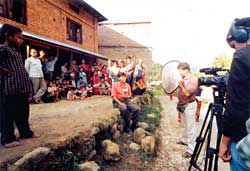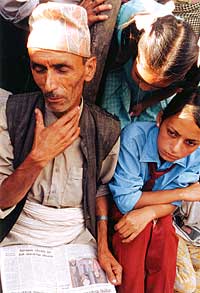 When news came last week that 13 Nepalis had been kidnapped in Iraq, it was no big surprise for the Ministry and Department of Labour. Officials had known all along that Nepalis have been sneaking into Iraq from Kuwait and Jordan.
When news came last week that 13 Nepalis had been kidnapped in Iraq, it was no big surprise for the Ministry and Department of Labour. Officials had known all along that Nepalis have been sneaking into Iraq from Kuwait and Jordan. "It has been an open secret that thousands of Nepalis are in Iraq," admits Labour Minister Raghuji Panta.
The insurgency, unemployment and poverty back home have made young Nepalis so desperate for jobs that they are willing to take the risk of working in a war zone like Iraq. Government officials admit the push factor is just too strong. "What can we do when the state of the country compels people to go to such places?" one senior Department of Labour official asked.
Minister of State for Foreign Affairs, Prakash Sharan Mahat, has appealed for the hostages' release through Al Jazeera television in Doha. But so far there has been no response from the kidnappers who belong to the shadowy Ansar al-Sunnah group. Government officials have also corresponded with their Iraqi counterparts to secure the release of the hostages.
The government has formed a three-member committee to probe how Nepalis end up in Iraq. It is coordinated by Labour Ministry Secretary Narayan Prasad Silawal, but until Thursday the committee had not even started work and does not have a deadline. "They will begin work at the earliest and they will have to submit the report as soon as possible," Minister Pant told us (see Interview). "We will take action against companies that are found responsible by the report."
But according to the hostages in Iraq, who were made to speak in front of tv cameras at gunpoint, the manpower agency that sent them should be held responsible. "We were kept as captives in Jordan first and they did not allow us to return home and forced us to go to Iraq," all 12 hostages shown on the tv footage said. "Moonlight Consultant's Pralhad Giri is responsible for all this. The government must take action against him and the manpower company."
 Family members are enraged. "When it has been proven that the manpower companies sent people to Iraq, which is prohibited, why can't the government arrest the agents?" asked Sudarshan Khadka of Lele, elder brother of Ramesh Khadka who is one of the 13 hostages. Moonlight Consultant has refused to meet family members.
Family members are enraged. "When it has been proven that the manpower companies sent people to Iraq, which is prohibited, why can't the government arrest the agents?" asked Sudarshan Khadka of Lele, elder brother of Ramesh Khadka who is one of the 13 hostages. Moonlight Consultant has refused to meet family members. Moonlight told us it sent 17 workers to Jordan, including Ramesh and eight others who are now in Iraq. "We completed all due processes and sent them to Jordan on 3 June," says Moonlight's director, KB Rana. "We had sent them to Morning Star company in Jordan, but another company called Besharath and Partners are said to have taken them to Baghdad to rebuild hospitals."
But Deepak Rijal, a Nepali journalist in Jordan, told the BBC Nepali service on Tuesday that the deal between Moonlight Consultant and the Morning Star company in Amman was in fact to send Nepali workers to Iraq. "Morning Star has confirmed this and so there is no reason for Moonlight to offer false explanations," Rijal says.
An official at the Association of Foreign Employment Agencies in Kathmandu admitted labour companies have been sending people to Iraq, while officially stating that they are going to the Gulf. "If a manpower agency says it is sending workers to countries like Jordan and Kuwait these days, you can be sure they will end up in Iraq," the official told us.
This is not something the government does not know. But none of the series of governments of late have corresponded with any of these countries' manpower agencies or with the Nepalis missions to confirm if Nepali workers are actually wanted there.
One of the agents whose clients are among those taken hostage in Iraq admitted anonymously that more and more manpower companies are working in partnership with Indian agents to send Nepalis to Iraq. "Even now there are at least three Indian agents in town coordinating between the agents here and the employer companies in Iraq," he said. "To know what is going on, all you need to do is flip through the pages of newspapers and see the advertisements seeking Nepali workers for these countries."
An added complication is that many Nepalis are going to India on their way to Iraq and being duped by middlemen. Some 10,000 Nepalis have been stranded in Mumbai because the agents promising to send them to Iraq took their money and simply disappeared. The Association of Foreign Employment Agencies has sent a team to Mumbai to find out the extent of the problem, but as many of them work hand-in-glove with Indian agents, it doesn't look like the swindled Nepalis will ever get their money back.
Officials say the demand is so great and there is such desperation here, it would be better to regulate migration to prevent exploitation of workers and ensure that Nepali middlemen can be held accountable if something goes wrong. Says one official: "The worst aspect of this is that crooked middlemen in India are swindling desperate Nepalis of everything they have."


